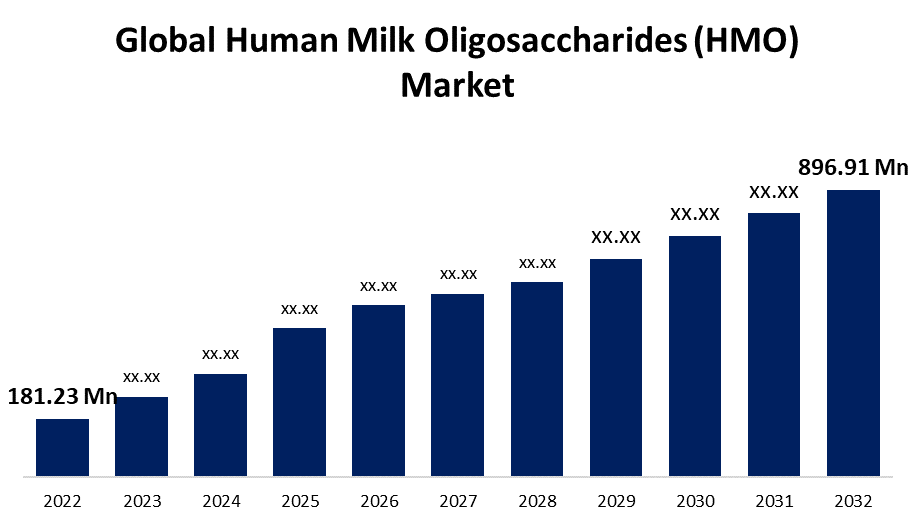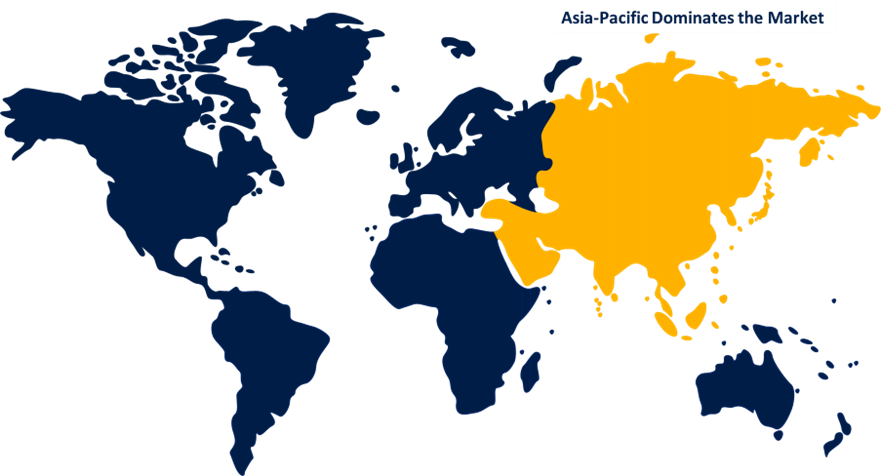Global Human Milk Oligosaccharides (HMO) Market Size, Share, and COVID-19 Impact Analysis, By Type (2’ Fl, 3’ Fl, 3’ Sl, 6’ Sl), By Concentration (Neutral, Acidic, Conjugated), By Distribution Channel (Hypermarkets & Supermarkets, Drug Store or Pharmacy, Mass Merchandiser, Departmental Stores, Mono-brand Stores, Specialty Stores, and Online Sales Channel), By Application (Infant Formula, Dietary Supplement, Dairy, Bakery), and By Region (North America, Europe, Asia-Pacific, Latin America, Middle East, and Africa), Analysis and Forecast 2022 – 2032
Industry: Food & BeveragesGlobal Human Milk Oligosaccharides (HMO) Market Insights Forecasts to 2032
- The Global Human Milk Oligosaccharides (HMO) Market Size was valued at USD 181.23 Million in 2022.
- The Market Size is Growing at a CAGR of 17.34% from 2022 to 2032
- The Worldwide Human Milk Oligosaccharides (HMO) Market Size is expected to reach USD 896.91 Million by 2032
- Europe is expected to grow the fastest during the forecast period

Get more details on this report -
The Global Human Milk Oligosaccharides (HMO) Market Size is expected to reach USD 896.91 Million by 2032, at a CAGR of 17.34% during the forecast period 2022 to 2032.
The market for human milk oligosaccharides has expanded as a result of its use as an additive in infant formula and functional foods. These compounds have qualities that enhance immune-mediated control, reduce inflammation, and promote newborns' neurological development. As people become more health-conscious and motivated to change their diets, there has been an increase in demand for such functional foods. However, the high cost of manufacture prevents the market's expansion. However, the human body uses HMOs as prebiotics, which support gut health. These promote the growth of bacteria, particularly the bifidobacterial genus, in the stomach, which enhances metabolic activity. They can be utilized in various food products, including pharmaceutical and therapeutic food as well as newborn formula, since the product's antimicrobial protection and prebiotic properties. HMOs are complex sugars that are present in mother's milk that cannot be digested by infants but are essential for the growth of their immune systems and gut health. The development of substitute sources, such as cow's milk and yeast-based human milk oligosaccharides, which are gaining popularity due to their equivalent efficacy as well as lower cost, was prompted by the high price and limited availability of human milk oligosaccharides.
Global Human Milk Oligosaccharides (HMO) Market Report Coverage
| Report Coverage | Details |
|---|---|
| Base Year: | 2022 |
| Market Size in 2022: | USD 181.23 Million |
| Forecast Period: | 2022-2032 |
| Forecast Period CAGR 2022-2032 : | 17.34% |
| 2032 Value Projection: | USD 896.91 Million |
| Historical Data for: | 2018-2021 |
| No. of Pages: | 200 |
| Tables, Charts & Figures: | 120 |
| Segments covered: | By Type, By Concentration, By Distribution Channel, By Application, By Region |
| Companies covered:: | Nestlé S.A., FrieslandCampina Domo, ZuChem Inc., Prolacta Bioscience, Abbott Laboratories, BioGaia AB, DuPont de Nemours, Inc., Inbiose N, Jennewein Biotechnologies GmbH, HMO Bioengineering, Evonik Industries AG, and other key vendors |
| Pitfalls & Challenges: | COVID-19 Empact,Challenges, Future, Growth, & Analysis |
Get more details on this report -
Driving Factors
According to the United Nations, around 250 infants are born every minute worldwide. There are more than 130 million babies born each year, or an average of 353,000 births every day. This immediately contributes to an increase in the global consumption of baby formula. This higher consumption is also caused by a number of other variables. Some of these include an increase in the proportion of women who return to work after having children, mothers' failure to produce enough milk, and better nutrition options for young children. According to the United Nations, the world's population is expected to reach 9.6 billion by 2050. The infant nutrition sector uses human milk oligosaccharides as a key component in the production of various infant formula and baby food items.
The infant nutrition industry uses human milk oligosaccharides as an important ingredient in the production of several baby formulas and baby foods. In the upcoming years, it is anticipated that this gradually increasing population will increase demand for human milk oligosaccharides as an ingredient in newborn formula.
Restraining Factors
Human milk oligosaccharide products have complicated, expensive to purchase, and unpredictable development and commercial features. The achievement of developing goods is influenced by technology developments, consumer demand, and governmental and regulatory frameworks. For a particular kind of HMO to be used in the R&D process to produce nutritional supplements or other functional foods like prebiotics, a large investment is needed. Additionally, producing and extracting a variety of different useful substances requires very sterile and sophisticated machinery and procedures. The price of the finished product is high due to the high cost of production. The distribution and marketing also raise the cost of the goods. Although consumers are aware of these expensive functional foods' health benefits. The high cost of these high-priced functional food products prevents customers from purchasing them even when they are aware of their health benefits.
Market Segmentation
By Type Insights
The 2’ Fl segment dominates the market with the largest revenue share over the forecast period.
On the basis of type, the global human milk oligosaccharides (HMO) market is segmented into 2’ Fl, 3’ Fl, 3’ Sl, and 6’ Sl. Among these, the 2’ Fl segment is dominating the market with the largest revenue share of 39.6% over the forecast period. 2'FL can help a baby's immune system develop, promote gut health, and provide cognitive benefits. Furthermore, the market for infant formula-containing HMOs is expanding, especially in areas featuring low rates of breastfeeding. As a result, producers of infant formula are adding 2'FL to their products more often. The gastrointestinal symptoms of a new newborn formula containing 2′-fucosyllactose (2′FL) were the same as those of a formula that did not contain 2′FL. However, infants who consumed milk containing 2′FL experienced fewer illnesses, which may indicate that 2′FL supports an infant's developing immune system.
By Concentration Insights
The acidic segment is witnessing significant CAGR growth over the forecast period.
On the basis of concentration, the global human milk oligosaccharides (HMO) market is segmented into neutral, acidic, and conjugated. Among these, the acidic segment is witnessing significant CAGR growth over the forecast period. A rise in demand for products containing HMOs can be caused by consumers' increasing understanding of the value of nutrition for infants. The creation of novel products that are meant to address certain health issues in infants has also been influenced by several studies studying the health benefits associated with acidic HMOs.
By Distribution channel Insights
The drug store or pharmacy segment is expected to hold the largest share of the global human milk oligosaccharides (HMO) market during the forecast period.
Based on the distribution channel, the global human milk oligosaccharides (HMO) market is classified into hypermarkets & supermarkets, drug stores or pharmacies, mass merchandisers, departmental stores, mono-brand stores, specialty stores, and online sales channels. Among these, the drug store or pharmacy segment is expected to hold the largest pine-derived chemicals market share during the forecast period. This is explained by the fact that drug store owners have prioritized convenience features like extended store hours and drive-through locations in order to draw and keep customers in the face of increased competition from mail-order retailers and supercenters. With growing consumer knowledge of the health advantages of human milk oligosaccharides (HMO) in baby nutrition, Europe is predicted to dominate the global market for HMO.
By Application Insights
The infant segment accounted for the largest revenue share of more than 74.15% over the forecast period.
On the basis of application, the global human milk oligosaccharides (HMO) market is segmented into infant formula, dietary supplements, dairy, and bakery. Among these, the infant formula segment dominates the market with the largest revenue share of 74.15% over the forecast period. HMOs are used in dietary supplements to boost the immune system, defend against viral and bacterial infections, relieve the digestive system, and promote brain health. The food supplement market is expanding as a result of rising healthcare expenditures, changing lifestyles, and an increase in the number of elderly individuals. Additionally, the pattern is further supported by expanding awareness of consumer health and rising disposable incomes.
Regional Insights
Asia Pacific dominates the market with the largest market share over the forecast period.

Get more details on this report -
Asia Pacific is dominating the market with more than 32.53% market share over the forecast. The human milk oligosaccharides (HMO) market is determined to be dominated by the Asia Pacific region, including nations like China, India, Japan, Australia, and New Zealand. The region, which is home to huge populations like China and India, has left a sharp increase in the number of newborns every year. The infant formula industry is being impacted by the trend of population growth because HMO is a key component in the formulation of newborn foods and other supplements.
Furthermore, the market for HMO-based infant formulae in New Zealand is anticipated to have substantial growth during the projected period since New Zealand is one of the biggest suppliers of infant formula to China, which provides considerable revenue for the nation. Japan is anticipated to keep an ongoing
Europe, on the contrary, is expected to grow the fastest during the forecast period. The United Kingdom has the lowest proportion of breastfeeding, which can be attributed to decreased financing for public health, a lack of awareness of the benefits of breast milk for health, and the prejudices associated with breastfeeding in public. The industry now has a big potential to break into the UK market. North America market is expected to register a substantial CAGR growth rate during the forecast period.
List of Key Market Players
- Nestlé S.A.
- FrieslandCampina Domo
- ZuChem Inc.
- Prolacta Bioscience
- Abbott Laboratories
- BioGaia AB
- DuPont de Nemours, Inc.
- Inbiose N
- Jennewein Biotechnologies GmbH
- HMO Bioengineering
- Evonik Industries AG
Key Market Developments
- In November 2022, Kyowa Hakko Bio Co. Ltd (Kyowa Hakko Bio), a subsidiary of Kirin Holdings Company, Limited (Kirin Holdings), completed a human milk oligosaccharide (HMO) production plant at its Thai subsidiary, Thai Kyowa Biotechnologies Co, Ltd.
- In January 2022, PREBILAC, BASF's brand of 2'-FL, was approved by Australia's Therapeutic Goods Administration (TGA) as a prebiotic ingredient, making it the first and only 2'-FL ingredient to get TGA clearance.
Market Segment
This study forecasts revenue at global, regional, and country levels from 2020 to 2032. Spherical Insights has segmented the global human milk oligosaccharides (HMO) market based on the below-mentioned segments:
Human Milk Oligosaccharides (HMO) Market, Type Analysis
- 2’ Fl
- 3’ Fl
- 3’ Sl
- 6’ Sl
Human Milk Oligosaccharides (HMO) Market, Concentration Analysis
- Neutral
- Acidic
- Conjugated
Human Milk Oligosaccharides (HMO) Market, Distribution Channel Analysis
- Hypermarkets & Supermarkets
- Drug Store or Pharmacy
- Mass Merchandiser
- Departmental Stores
- Mono-brand Stores
- Specialty Stores
- Online Sales Channel
Human Milk Oligosaccharides (HMO) Market, Application Analysis
- Infant Formula
- Dietary Supplement
- Dairy
- Bakery
Human Milk Oligosaccharides (HMO) Market, Regional Analysis
- North America
- US
- Canada
- Mexico
- Europe
- Germany
- Uk
- France
- Italy
- Spain
- Russia
- Rest of Europe
- Asia Pacific
- China
- Japan
- India
- South Korea
- Australia
- Rest of Asia Pacific
- South America
- Brazil
- Argentina
- Rest of South America
- Middle East & Africa
- UAE
- Saudi Arabia
- Qatar
- South Africa
- Rest of Middle East & Africa
Need help to buy this report?